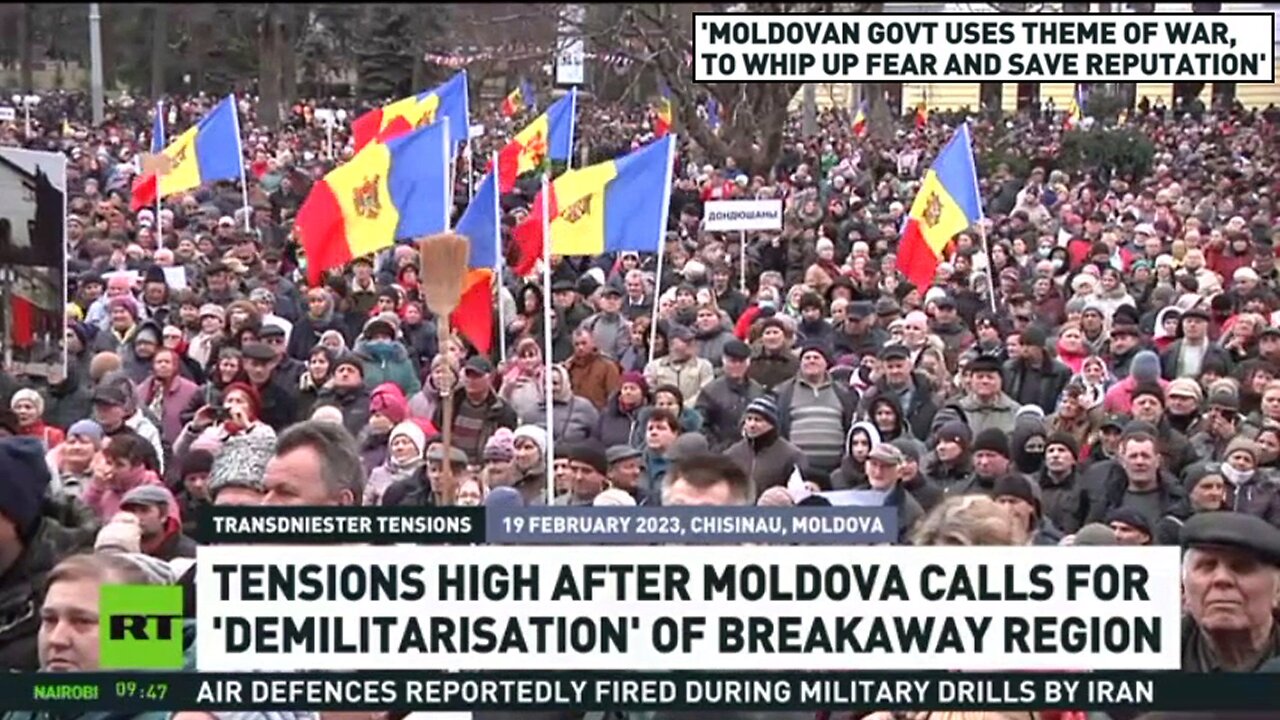Premium Only Content

RT News - February 24th 2023
United Nations: China has called on the West to stop abusing unilateral sanctions and do their share in deescalating the Ukraine crisis, saying dialogue and negotiation are the only viable solution to the conflict.
India also took the floor at the UN General Assembly, saying the interests of both Russia and Ukraine must be respected, to achieve peace. That's as Kiev rejects the possibility of speaking with Moscow.
-
In an exclusive interview to 'Going Underground' renowned investigative journalist Seymour Hersh breaks down the US sabotage of the Nord Stream pipelines, which he recently exposed in a bombshell report that's been denied by Washington. Trailer : https://rumble.com/v2aoakq-seymour-hersh-talks-nord-stream-revelations-with-going-underground.html?mref=6zof&mrefc=6
-
Moscow says Ukraine is preparing to invade the neighbouring self-proclaimed republic of Transdniester (often known as Transnistria) where Russian peacekeepers have been stationed for more than three decades to prevent a military escalation. (QS: Over the past year, there have been protests in Moldova, situated along the south and west of the self-identifying neutral state of Transnistria. Transnistria is a narrow strip of land between the Dniester river and the Ukrainian border and it broke away from Moldova in 1990. It has it's own government, Vadim Krasnoselsky won the presidential election with 79.4% of the vote. The Moldovan government called on "foreign partners" not to send observers to the elections in Transnistria, saying that the elections are a threat to Moldova’s sovereignty and territorial integrity. Transnistria held an independence referendum in September 2006 but it isn't recognised by Moldova or the "international community", saw the territory reassert its demand for independence and vote in support of union with Russia. https://en.wikipedia.org/wiki/2006_Transnistrian_independence_referendum ) A really cracking video from B & B can be found here (recommended fun, 18 mins long https://youtu.be/5kVnrqBb6y4 ))
Africa, Nigeria elections: Tomorrow (Saturday) see the chance for Nigerians to select one of 18 candidates as their president. RT continues the special coverage with many contributions and takes. Poloum David reports. (QS - who is your money on?). Meanwhile the USA is "encouraging" people to vote in their own inimitable way and completely out of the blue (QS a bit like Pres Obama taking days out to visit Britain during the Brexit campaign/vote - which in my opinion has come to nothing and we might as well not have bothered. USA via EU and a corporate/bank based, non-representative government system, was never going to let Britain become independent again). Achike Chude comments on the strangeness of the address by U.S. .gov. Watch RT on Rumble live stream or shorts for updates or check in here on this channel twice a day.
Donbass/Donetsk: **Stop Press** Russian troops have taken the key village of Berkhovka, north of Artyomovsk. (via TASS - MILITARY OPERATION IN UKRAINE24 FEB, 06:26
Wagner Group founder: Berkhovka village by Artyomovsk fully under Russian forces’ control
The village of Berkhovka is located northwest of Artyomovsk MOSCOW, February 24. /TASS/. The village of Berkhovka, seven kilometers north of Artyomovsk (Ukrainian name: Bakhmut) in the Donetsk People’s Republic, has been fully taken under the control of Russian forces, the founder of the Wagner private military company, Yevgeny Prigozhin, said.
"Berkhovka is fully taken under our control. Vagner PMC units are in full control of Berkhovka," Prigozhin’s press service quoted him as saying on Friday on its Telegram channel.
===========================================
Below, via RT website ---- - A) --- Ukrainian FM dodges question on strikes deep into Russia
B) --- Russia-EU relations ‘no longer exist’ – Moscow
-
2) --- Seymour Hersh explains why US blew up Nord Stream
3) ---US expands probe of cancer risks at ICBM bases
4) --- ISIS women force boys to impregnate them – media (bizarre)
4a) --- ‘ISIS bride’ loses citizenship appeal
5) --- Ukraine demands Germany cross all weapons ‘red lines’
6) --- From Vikings to PMCs: How Russia fought wars during its thousand year history **Feature**
7) --- Helicopter with Iranian sports minister crashes
8) --- Can India supplant China as the voice of the Global South?
9) --- NATO blasted for comparing Ukraine conflict to Star Wars and Harry Potter
===========================================
23 Feb, 2023 18:15
A) --- Ukrainian FM dodges question on strikes deep into Russia
Kiev “can guarantee” it will use longer-range weapons to “liberate” the territories it claims, Dmitry Kuleba says
Ukraine is committed to using Western-supplied arms to seize back its former territories from Moscow, Foreign Minister Dmitry Kuleba said on Thursday. The top diplomat, however, stopped short of giving a promise to not use such weaponry to strike deep into the rest of Russia.
Speaking to Sky News, the minister reiterated Ukraine’s repeated requests for modern Western-made jets. So far, however, no country has provided Kiev with such aircraft, while numerous top officials have expressed fears that doing so would greatly escalate the hostilities and may potentially lead to a direct collision between NATO and Russia.
“We’re using weapons which we receive from partners to strike Russia in the occupied territories of Ukraine,” Kuleba told the outlet, apparently referring to the Donetsk and Lugansk People’s Republics, which, along with Kherson and Zaporozhye Regions, overwhelmingly voted to join Russia last autumn – just as the Crimean peninsula did in 2014.
When pressed on whether Kiev could promise that it would not use long-range weapons and jets for strikes inside Russia, Kuleba dodged the question, offering a somewhat vague “guarantee” instead.
“We can guarantee that we will be using Western weapons to liberate Ukrainian territories,” he stated.
Moscow has repeatedly accused the collective West of enabling Ukraine to strike deeper into Russian territory. In his annual address to the Federal Assembly earlier this week, Russian President Vladimir Putin said Kiev’s handlers had been directly involved in drone attacks on the country’s facilities housing strategic, nuclear-capable aviation.
“We know that the West was directly involved in the attempts by the Kiev regime to strike the bases that house our strategic aircraft,” Putin stated. “The drones used [in the raids] were equipped and upgraded with help from NATO experts.”
Citing the ongoing hostilities and the Western involvement in them, the Russian president announced the decision to suspend the 2010 New START Treaty with the US that caps the number of nuclear warheads that can be possessed and the means of delivery, as well as allowing for inspections of each other’s nuclear arsenal.
“I want to emphasize: The US and NATO are saying outright that their goal is to inflict a strategic defeat on Russia. And, after this, they are going to tour our defense sites as if nothing is happening?” Putin stated in his address.
https://www.rt.com/russia/571986-ukraine-western-weaponry-strikes/
=============================================
23 Feb, 2023 18:44
B) --- Russia-EU relations ‘no longer exist’ – Moscow
The bloc chose economic ruin to be a vassal of the US, Moscow’s envoy to the UN has said
Relations between the European Union and Russia are practically nonexistent, consumed by the abyss of EU subservience to the US, the Russian Permanent Representative to the UN Vassily Nebenzia told the Security Council on Thursday.
Moscow had said in June 2022 that the “bottom had fallen out” when it came to relations with Brussels, Nebenzia said in his speech at the UN.
“It turns out there was an entire abyss below still, that swallowed up not only our relations – which are basically nonexistent now – but also the EU itself,” he said.
“A year after completely severing ties with our country, the GDP growth of the EU has stuck near zero. At the same time, record inflation rates are measured by double-digit indicators. Rejoicing that it jumped off the ‘Russian gas needle,’ the EU got hooked on ‘hard drugs’ – expensive American liquefied natural gas,” the Russian diplomat added.
Nebenzia also accused the EU of openly discussing how to dismember and destroy Russia. Earlier this week, the Estonian prime minister suggested Russian history needs to be rewritten and its population re-educated, to protect Europe from “Russian imperialist dreams.”
Never in the history of Europe has the continent been so “subservient” to the US, Nebenzia argued, pointing to last September’s sabotage of Nord Stream.
“Things have come to the point where Brussels has silently swallowed that its closest ally blew up the main gas pipeline, which was also paid for by European investors,” he said, adding that EU members are even covering up inconvenient truths in order to shield the US.
The twin pipelines running under the Baltic Sea were built to supply the continent with Russian natural gas via Germany. Denmark, Sweden and Germany have refused Russian requests for information about their investigation into the blasts.
In an article published earlier this month, American investigative journalist Seymour Hersh claimed the US and Norway had conspired to destroy the pipelines and described how they carried it out. Russia has called for a UN investigation into the sabotage. The US has denied any responsibility for the Nord Stream bombing.
https://www.rt.com/news/571987-russia-eu-relations-nordstream/
========================================
23 Feb, 2023 22:13
2) --- Seymour Hersh explains why US blew up Nord Stream
Political reasons drove the decision to detonate the charges, says the investigative journalist
US President Joe Biden ordered the destruction of the Nord Stream pipelines in order to make sure Germany could not change its mind about sanctions against Russia and weapons shipments to Ukraine, investigative journalist Seymour Hersh said in an interview with ‘Going Underground’.
Earlier this month, Hersh published an article that blamed the US and Norway for the series of explosions that disabled both Nord Stream 1 and Nord Stream 2, the pipelines under the Baltic Sea built to supply Western Europe with Russian natural gas.
In an interview with Afshin Rattansi this week, Hersh said the US intelligence community hatched the plan “in late 2021,” before the escalation of hostilities in Ukraine. When Biden and Under Secretary of State Victoria Nuland both publicly spoke about “stopping” and “ending” Nord Stream 2, however, Hersh claimed the spies were upset, “because it was supposed to be a covert operation.”
“The people who did this thing in the intelligence community, they initially thought it was a great idea,” Hersh told Rattansi. According to his story, the bombs were planted in June, during the scheduled BALTOPS 2022 naval exercise off the Danish island of Bornholm. The bombs went off in late September, as Ukraine was facing “a serious issue” on the battlefield.
“It’s not going to help the war. What he was doing it for, was to prevent Germany and Western Europe, in case the winter came quickly, from opening up the pipeline,” Hersh said.
The rationale for the mission was “to make sure that Europe keeps on supporting NATO and keeps funneling arms into what is clearly a proxy war against Russia that’s being fought right now,” he added.
Asked whether Moscow had somehow missed the American involvement, and focused on the UK instead, Hersh said he had not spoken to anyone in Russia. One thing he could say is that it would be “absolutely insane” for Russia to blow up its own pipeline. Just about everyone in the pipeline business agrees with that assessment, he added.
The White House, the Pentagon and the State Department have all disavowed Hersh’s article as “fiction” and denied all accusations of US involvement in the attack on Nord Stream. Russia has called for an independent UN investigation into what it described as an act of international terrorism.
The full interview will air on Saturday’s episode of Going Underground. Trailer : https://rumble.com/v2aoakq-seymour-hersh-talks-nord-stream-revelations-with-going-underground.html?mref=6zof&mrefc=6
-
https://www.rt.com/news/571996-seymour-hersh-going-underground/
============================================
23 Feb, 2023 21:00
3) ---US expands probe of cancer risks at ICBM bases
The Air Force has pledged to conduct a comprehensive assessment of a possible link between missile jobs and lymphoma cases
The US Air Force has launched an investigation of cancer risks for service members at the country’s intercontinental ballistic missile (ICBM) installations, formalizing and expanding a probe that was spurred by a report last month of lymphoma cases among missileers who had worked at a Montana base.
General Thomas Bussiere, commander of US ICBM forces, approved a comprehensive study of cancer risks at missile bases in Montana, Wyoming and North Dakota, the Air Force announced on Wednesday. A US Space Force officer reportedly revealed last month that 36 missileers who had been stationed at Montana’s Malmstrom Air Force Base as far back as 25 years ago had been diagnosed with cancer, including ten cases of non-Hodgkin lymphoma (NHL).
“Air Force Global Strike Command and our Air Force takes the responsibility to protect airmen and [Space Force] guardians incredibly seriously, and their safety and health continues to be my priority,” Bussiere said in a statement. “We also continue to be committed to remaining transparent during this process and we pledge to continue to maintain an open dialogue with members, their families and stakeholders throughout this process.”
US Senator Jon Tester, a Montana Democrat, said NHL cases among former missileers appear to be far higher than the national average. He noted that only around 400 airmen work in Malmstrom’s 150 Minuteman III missile silos. NHL is considered a rare cancer in the US, with an average of just 19 new cases diagnosed annually per 100,000 people. The former airmen are well below the median diagnosis age of 67, he added.
Missileers can be exposed to a variety of toxins and chemicals, such as radon, asbestos, lead and polychlorinated biphenyls. Health concerns date back to well before the Minuteman era. Military.com noted that from 1975 to 1979, there were 125 leaks of propellant from Titan II missiles at bases in California, Arizona, Arkansas, and Kansas. One such leak killed two airmen and forced the evacuation of a small Kansas town.
The Air Force Medical Service (AFMS) said an investigation of cancer concerns at Malmstrom in 2001 found no increased rates of NHL among missileers. “However, we acknowledge time has passed,” the AFMS said, adding that it has a responsibility to re-examine possible health risks to service members.
https://www.rt.com/news/571997-us-probes-cancer-risk-at-icbm-bases/
==================================
23 Feb, 2023 18:39
4) --- ISIS women force boys to impregnate them – media
Female detainees in Syrian camps have reportedly used teen males as sex slaves to help populate the so-called Caliphate
Women ISIS devotees held in Syrian detention camps have forced boys as young as 13 to serve as sex slaves to impregnate them and help boost the population of the “Caliphate,” the Daily Beast reported on Thursday.
At least ten boys at Camp al-Hawl in northeast Syria were conscripted to have intercourse with dozens of women, the US media outlet said, citing unidentified Syrian Defense Force (SDF) officials. The Syrian government has detained about 8,000 ISIS-affiliated women and children since the terrorist group’s defeat in 2019. Adult male ISIS members are held in separate camps.
“We are being forced to have sex with the ISIS women, to impregnate them,” two teens identified as Ahmet, 13, and Hamid, 14, told a guard at Camp al-Hawl. “Can you get us out of here?” One of the boys was required to have sex with eight ISIS women in just a few days.
Security forces confirmed that teen boys at Camp al-Roj, also in northeastern Syria, had been subjected to similar exploitation, the Daily Beast said. In fact, one of the boys collapsed and was hospitalized after being given a Viagra-like substance to make him perform. Mothers at al-Roj, seeking to protect their sons from sexual enslavement, have begged camp authorities to transfer their boys to rehabilitation centers.
Syrian defense officials have recently adopted a policy of moving boys who have reached puberty to such rehabilitation facilities, where they receive anti-extremism counseling and are prepared for reintegration into society. The United Nations decried the policy last week, calling it “unlawful” and suggested that they may be “forcibly disappeared” or sold.
Many of the ISIS women have refused repatriation to their home countries for themselves and their children. Others, such as “ISIS bride” Shamima Begum of the UK, were stripped of their citizenship and barred from returning.
https://www.rt.com/news/571990-isis-women-use-boys-as-sex-slaves/
================
22 Feb, 2023 14:27
4a) --- ‘ISIS bride’ loses citizenship appeal
Shamima Begum will remain imprisoned in Syria
Shamima Begum, who left the UK at 15 to join the Islamic State terror group, has lost an appeal against an earlier decision to strip her of her British citizenship. Despite Begum’s admission that she voluntarily traveled to the ‘Caliphate,’ her lawyers tried to make the case that she was trafficked.
Begum was stripped of her citizenship in 2019 on grounds of national security, after she was discovered in a detention camp in Syria following the defeat of Islamic State (IS, formerly ISIS). She had left London four years earlier to join the group, marrying a jihadist shortly after arriving in Syria and having three children, all of whom died.
Begum, now 23, challenged the government’s decision at a secret hearing in November, but the Special Immigration Appeals Commission ruled on Wednesday that it was lawful.
In his ruling, Judge Robert Jay wrote that while the national security threat posed by Begum is debatable, this issue is “for the secretary of state to evaluate and not for the commission.”
Begum’s legal team argued that then-Home Secretary Sajid Javid failed to consider whether the teenager had been a victim of child trafficking when she left for Syria in 2015. Jay wrote that while “there was a credible suspicion that Ms Begum had been trafficked to Syria” and sexually exploited, the evidence of this was insufficient to trump Javid’s national security concerns.
Since she was discovered in Syria, Begum has spoken extensively to the press, becoming one of the most widely-known ‘ISIS brides.’ She told reporters in 2019 that she didn’t regret making the trip, and that the sight of severed heads “didn’t faze me at all.” In further interviews she described terror attacks on British soil as “justified,” but insisted that she was ready to return to the UK and live a regular life.
Despite losing her British citizenship, Begum is not stateless, and is a citizen of Bangladesh by descent. However, she has made no attempts to seek transfer to Bangladesh, where Foreign Minister Abdul Momen warned in 2019 that she would face the death penalty for terrorism.
https://www.rt.com/news/571920-shamima-begum-citizenship-appeal/
==============================================
23 Feb, 2023 20:34
5) --- Ukraine demands Germany cross all weapons ‘red lines’
Berlin should supply fighter jets and warships to Kiev, a scandal-plagued diplomat has said
Berlin should cross its “self-drawn red lines” and provide Kiev with “all available” arms, Andrey Melnik, Ukraine’s deputy foreign minister and former envoy to Germany, said on Thursday.
Speaking to the German DPA press agency, Melnik lauded Berlin for making the decision to “break an epochal taboo” and pledge support to Kiev early in the conflict with Russia. However, the diplomat stressed that the pledge had actually turned into a “zigzag course,” with Berlin erecting numerous obstacles on its own path to supplying Ukraine with weapons.
“The implementation of this turning point lags considerably, it is more reminiscent of a zigzag course with many setbacks rather than of a strategic advance,” Melnik stated, admitting that there were still way too many “brake pads” on that path, particularly in Chancellor Olaf Scholz’s Social Democratic Party (SPD).
“We the Ukrainians therefore call on the Chancellor to cross all self-drawn red lines and to provide Ukrainian armed forces with all available weapon systems,” the diplomat said, adding that Kiev expects more “courageous” decisions from the ruling coalition. The new weapons deliveries for Kiev could include fighter jets, as well as warships and submarines, Melnik suggested.
The diplomat, whose tenure as Kiev’s ambassador in Berlin extended into the early phase of the ongoing conflict, has repeatedly made headlines for insulting German officials and politicians. Most notoriously, he branded Scholz “an offended liverwurst” for his taking issue with Kiev’s negative view toward German President Frank-Walter Steinmeier. Melnik is also known for repeatedly posting foul-mouthed tweets and becoming embroiled in a spat over Tesla and SpaceX CEO Elon Musk’s controversial peace plan for Ukraine.
https://www.rt.com/russia/571992-ukraine-germany-red-lines/
==========================================
23 Feb, 2023 18:48
6) --- From Vikings to PMCs: How Russia fought wars during its thousand year history **Feature**
How military service in the world's largest country has evolved, from Tsars to Bolsheviks to the modern state
For over 100 years, Russia has celebrated Defender of the Fatherland Day on February 23. The holiday, which originally glorified the Red Army, took on wider meaning after the fall of the USSR. Presently, the holiday sees Russians celebrating all those who served in the military in defense of their country.
It is roughly equivalent to the American Veteran's Day or the British Armed Forces Day.
The military has always been respected in Russia. But over the country’s thousand-year history, the system has undergone major changes.
Varangians: Strangers from the north
-
At the dawn of the existence of Rus, the Slavic tribes that populated the land that would become Russia had no army of their own. Whenever conflicts became violent, they resembled 'wall on wall' fist fights. These confrontations continued in this manner until the Slavs learned the art of war from their northern neighbors and colonizers – the Varangians.
The Varangian guard, which took control of the trade route that passed through central Rus to the Greek civilizations, called themselves 'rowers', since they used row boats in their military campaigns. It is thought that the ancient Scandinavian word “rōþr” at some point evolved into the similar sounding 'rus'. It’s highly likely that the future name of Russia thus sprang from the self-designated name of the Varangian warriors.
The people of Rus wore simple shirts and helmets. They were mainly armed with spears and axes, while a sword marked a warrior’s superior status. They fought on foot, moving along rivers on boats called drakkars, which were rolled over rapids. The Varangians engaged in the great Viking tradition of trade and raids – pretty much the same as in Western Europe at the time.
One of the most famous Varangians and first rulers of Rus was Grand Prince Svyatoslav, who fought Bulgaria, the Byzantine Empire, and the Khazar khaganate. Some sources mention large raids as far away from the center of Rus as the southern Caspian lands.
Boyars-Vigilantes: The first warriors in Rus
-
As the ancient Russian principalities were established, grew more powerful, and formed a settled economy, the Varangian-Rus people increasingly assimilated. In their turn, the Slavs adopted Varangian methods of warfare. This process, along with the need to protect the territories under their control, resulted in the formation of a new kind of military organization – the princely vigilante squad.
These were boyar warriors from among the prince’s loyal inner circle. They equipped themselves with war horses, armor, pikes, and swords at their own expense. In military campaigns, the unit was accompanied by a foot detachment of 200-300 spearmen. These combat groups were quite mobile and were able to quickly respond to the raids of the Polovtsians and Pechenegs. Unfortunately, by the time of the Mongol invasion, these detachments had not sufficiently evolved – still small in number and dispersed, they could not effectively fight the horde from the East.
Streltsy: The first permanent army
-
Despite the defeat by the Mongols, the vigilantes and local militias continued fighting during the internecine wars of the 14th and 15th centuries, until a single state was formed under Ivan the Terrible.
It was then that the first unified regular army appeared in Russia, called the Streltsy. This reform occurred in 1550 and a special order (ministry) was created. This first army wasn’t large – it consisted of no more than 3,000 soldiers. However, the Streltsy were paid and were not obliged to work the land, which greatly facilitated social mobility in those days. The privileges, allowance, and a rather free lifestyle made the new profession extremely popular, and within 50 years, there were over 20,000 Streltsy in Moscow and the regions.
The Streltsy wore a kaftan and gloves and had uniform weapons. They were armed with a “bardishe” (poleaxe with a long shaft), a “pischal” (the Russian equivalent of an arquebus or long gun), and a saber. To achieve greater firing accuracy during important battles, the shaft of a bardishe was used to support the pischal. The Streltsy also often carried low-power powder grenades.
In addition to military duties, the Streltsy had civic duties, acting as policemen and firemen, They also often interacted with the local cavalry. In battle the Streltsy were directly responsible for the capture of Kazan (1552) and Astrakhan (1556), and most importantly, the retention of these territories.
Russia learns from the West
-
After the fall of the Rurik dynasty and the onset of the Smuta (The Time of Troubles), Russia was forced to adapt and change its military system because of the prolonged war with Poland and the occupation of Russia’s northern territories by Sweden. To fight the occupation, “foreign formation regiments” were organized. These military units were made up of servicemen, “willing” free people, foreigners, Cossacks, and other mercenaries.
The new regiments did not replace the Streltsy but used more modern tactics to fight. This included the placement of pikemen in front of the musketeers, which increased the tactical manoeuvrability of combat detachments.
By the 1630s, the foreign formation regiments had evolved into the first Hussar and Reiter companies. These were in fact knights with long pistols. They wore cuirasses and helmets, but when attacking, they fired dozens of heavy bullets at the enemy and then either retreated to reload or finished the enemy off with daggers and these meter-long pistols.
Peter the Great’s reforms – the first conscription army in Russia
-
Although the Hussar and Reiter regiments were quite effective, they still weren’t large enough. The Streltsy, who took on the role of a mass army, unfortunately engaged in a dispute with the young Tsar Peter I. The conflict prefaced large-scale military reform. In 1705, the future emperor and founder of the Russian Empire issued a decree “On the recruitment of soldiers from free people”. It was then that the term “recruit” was legally endorsed. Peter I “copied” this innovation from Sweden, which had a strong regular army.
The decree stated that from each village, town, community, and household, one person (except for the head of the family and the breadwinner) must be sent to the army for a lifetime of service and must become a soldier. This person was to be chosen by lot. In the early years of the law, all classes were subject to conscription. All nobles were obliged to serve in the army, and communities were required to regularly provide a certain number of recruits between the ages of 20-35.
In addition to the professional army, Peter I also established the Russian navy, military industry, and military academies.
By the end of Peter the Great’s reign, the regular army numbered 200,000 to 300,000 in all military service branches. This was an impressive number for a country with a population of 13 million. The duration of military service also became shorter over time. Lifetime military service was dispensed with, and soldiers went into “reserve”, being called to the army only in case of war. However, for many decades the duration of military service didn’t drop below 20 years.
The army of the Empire
-
The next major reform of the Russian army took place in the 19th century. Any defeat brings with it necessary lessons, and such was the case with the Crimean War, which resulted in Milyutin's sweeping reforms. The main innovation was the transition from Peter the Great’s recruitment system to universal military service – a standard practice in European armies. From that time on, all men between the ages of 21 and 40 were required to be on active military duty. In the ground forces, the duration of service was 15 years: six years of active service and nine years in reserve. After that, men were enlisted in the State Militia (the reserve of the armed forces, convened only in case of war) until they turned 40.
Additionally, instead of permanent armies and corps, Milyutin formed military districts with stationed units. This meant that soldiers and officers no longer had to permanently live in tents.
The second half of the 19th century was also marked by qualitative changes. Particular attention was paid to the army’s technical equipment. The end of the century saw the development of aeronautical and railway units. In 1885, a team of military aeronauts was formed (using hot air balloons or airships), with the East Siberian Field Aeronautical Battalion taking part in the Russo-Japanese War of 1904-1905. In 1911, the first aviation detachment appeared in Russia, and by the beginning of the First World War, there were 39 such groups. The famous “Ilya Muromets” heavy bombers also appeared at that time.
In those years, state-owned factories and logistics expanded, all combat units were equipped with machine guns, and telephone lines were installed between the various units.
Fundamental changes also concerned military service admission. The term of active service in the infantry and foot artillery was three years, in other branches of the ground forces it was four years, and in the Navy, it was five. Some categories of citizens were given privileges. Men who were unable to carry weapons for health reasons and some clergy were exempt from military service.
The Soviet Army
-
In the first months after the October Revolution of 1917, the Soviet government sought to create an army based on the militia system. This supposed that during peacetime, military units would consist only of the accounting apparatus and limited command staff, drawing upon locally registered fighters in times of need.
In the first months following the revolution, the army was composed of volunteers with the number of troops reaching just below 200 thousand. In order to create a regular army, the resolution "On the organization of the Red Army" was adopted on July 10, 1918. Men from 18 to 40 years old were subject to conscription and by November 1921, the Red Army numbered 5.5 million.
Nazi Germany’s invasion of the Soviet Union became a real test for the army, and the Soviet military system was not ready for it. Victory in the war cost the USSR the lives of tens of millions of people.
The conflict completely transformed Russia’s military system. In 1946, the Workers' and Peasants' Red Army was replaced by the Soviet Army. In the 1950s, the Armed Forces of the USSR were equipped with nuclear missiles and other advanced military equipment. The Soviet Armed Forces consisted of Ground Forces, Strategic Missile Forces, Air Defense Forces, the Navy, and the Air Force. This has all been inherited by the Russian Federation.
Present times
-
In Russia’s recent history, the army was at its largest in December 1991, when it numbered about 3.8 million servicemen. In 1992, Boris Yeltsin reduced the number of servicemen to 2.1 million in 1994 and by 1996, to 1.7 million.
At the end of August 2022, Vladimir Putin signed a decree increasing the personnel of the Armed Forces of the Russian Federation from 1.9 million to 2.04 million. This came into effect on January 1, 2023.
The Ukraine conflict has impacted Russian military service. Partial mobilization was announced for the first time in the history of the Russian Federation, and 300,000 people who had previously served in the army were called up. Moreover, private military companies became more prominent in light of the conflict.
Among these, the most widely known organization is PMC Wagner Group – currently one of the most effective units of the Russian military.
By Anatoliy Brusnikin, Russian historian and journalist
-
https://www.rt.com/russia/571930-from-varangians-to-partial-mobilization/
==========================================
23 Feb, 2023 15:01
7) --- Helicopter with Iranian sports minister crashes
His adviser was killed, while other people on board sustained injuries
A helicopter carrying Iranian Sports Minister Hamid Sajjadi crashed while landing in the southern part of the country on Thursday. According to local authorities, the minister’s adviser was killed in the crash, while the top official himself, as well as other passengers and crew members, sustained minor injuries and has been taken to the hospital.
The accident took place while the aircraft was landing at the sports complex in the city of Baft. Local governor Mohammad Mehdi Fadakar said that the aircraft had 12 passengers on board.
Citing an eyewitness, the IRNA news agency reported that Sajjadi appeared to be in “good condition.” Meanwhile, his adviser, Esmail Ahmadi, died in the crash.
Photos and videos released by local media outlets show a helicopter turned over on its roof, with no signs of fire or smoke. The helicopter also seems to have lost its trail. Other pictures show a sizable crowd not far from the aircraft’s wreck, as well as emergency services vehicles parked nearby.
https://www.rt.com/news/571979-iran-helicopter-minister-crash/
============================================
22 Feb, 2023 08:59 -- OP ED --
8) --- Can India supplant China as the voice of the Global South?
New Delhi seeks to expand its influence over Asian, African and Latin American countries looking for ways out of Beijing’s debt burden. By Joydeep Sen Gupta, Asia Editor
-
India is pulling out all the stops to emerge as the self-appointed leading voice of the Global South by dislodging its ‘hostile’ neighbor China.
The developing economies in Asia, Africa and Latin America, collectively dubbed the Global South, will come under New Delhi’s soft power lens at the first G20 finance ministers and central bank governors meeting under India’s G20 presidency, which will be held in Bengaluru on February 24 and 25. India’s Finance Minister Nirmala Sitharaman and Reserve Bank governor Dr Shaktikanta Das will jointly chair the meeting.
To be sure, in its bid to become the voice of the Global South, India is going up against the financial muscle of China, which is giving away billions of dollars in soft loans and grants to these developing economies. One example of this is Chinese President Xi Jinping’s ambitious Belt and Road Initiative (BRI), extended to around 150 countries and at an estimated cost of $8 trillion, of which Beijing has spent upwards of $1 trillion.
New Delhi is taking a contrarian stance to China’s and is trying to impress upon the cash-strapped nations across these three continents the importance of debt relief. Otherwise, they may end up with what happened in Sri Lanka last year, where an unprecedented economic crisis triggered in part by external debt led to massive anti-government protests. Pakistan, too, is heading for a similar economic crisis.
India is keen to chart its own course as New Delhi is ‘cocking a snook’ at the US and Western sanctions over Russia’s military operation in Ukraine, which enters its second year on Friday – the day the meeting in Bengaluru starts.
The US courts India
-
India is willing to play ball with Russia over energy security, while Washington simply can’t afford to isolate New Delhi because of its growing geostrategic and economic heft.
In absolute numbers, China’s economy is far stronger than India’s. For instance, while data shows that the gross domestic product (nominal) of both Asian countries was almost equal in 1990, China has since forged ahead at a tremendous pace. As of 2021, China’s GDP was 7.7 times greater than India’s, while on purchasing power parity (PPP), China outpaced India by 2.7 times.
However, there appears to be a discernible shift in the power structure. India, under Prime Minister Narendra Modi, is working on making itself more attractive for foreign investments, which were pegged at about $85 billion last year, compared to China’s $189 billion. The paradigm shift is in the works because American policymakers are acutely mindful of the fact that Indian economic growth holds the key to Washington’s lofty strategic ambitions in the Indo-Pacific.
Successive US administrations – irrespective of their political hues – are in favor of made-in-India products having access to American markets, as China loses its manufacturing sheen to other Asian nations such as Vietnam, Malaysia, Bangladesh, India and Taiwan.
In the shifting geostrategic power structure, as exemplified by the running feud between the US and both Russia and China, more emphasis is being laid on the Quad grouping: the US, India, Japan, and Australia.
New Delhi’s priorities
-
India’s priorities during the year-round G20 activities include pushing for a raft of reforms in global institutions, creating awareness of the dire need for economic aid for low- and middle-income countries, who are facing mounting debts and cannot service them. Climate initiatives and sustainability challenges also figure high on the agenda, according to India’s Chief Economic Adviser V Anantha Nageswaran.
India’s G20 sherpa Amitabh Kant, too, has been turning up the heat on China to come clean on its loans to the developing countries.
“China needs to come out openly and say what their debt is and how to settle it,” said Kant, according to a Bloomberg news report. “It can’t be that the International Monetary Fund [IMF] takes a haircut and goes to settle Chinese debt. How is that possible? Everybody has to take a haircut,” the sherpa was quoted as saying.
According to World Bank, the world's 74 lowest-income nations are indebted to China to various degrees. Countries heavily in debt to China are largely located in Africa, but there are several nations in Central Asia, Southeast Asia and the Pacific as well. Of the $35 billion that these low-income nations, such as Angola, Ethiopia, Djibouti, Pakistan, Sri Lanka and the Maldives, owed in debt service payments last year, about 37% or $13.1 billion was to state-run Chinese entities.
Challenges before the Global South
-
The Global South is facing critical issues like an unabated rise in the prices of crude oil, food, and fertilizers, in addition to the mounting debt and rapidly deteriorating economic growth. Last November, during his talks with Russia’s Foreign Minister Sergey Lavrov in Moscow, Jaishankar said, “The Global South feels the pain [of rising prices].”
He spelled out India’s need to buy oil from Russia. “India is the third-largest consumer of oil and gas, where incomes are not very high. We need to look for affordable sources, so the India-Russia relationship works to our advantage. We will keep it going.”
Voice of the Global South Summit
-
Earlier, Jaishankar had defined the thrust of New Delhi’s G20 presidency, and referred to India as “the voice of the Global South.” Modi appeared to have taken a cue from Jaishankar and convened a virtual summit of developing countries on January 12–13, which he christened the “Voice of the Global South Summit.”
Eight ministerial-level thematic sessions were held, which involved the ministers of finance, trade, environment, energy, health, and education. Two sessions were for the foreign ministers, where the focus was on the priorities of the Global South, and their suggestions for India as the G20 president.
Valuable input was provided by foreign participants. For example, Mozambique’s President Filipe Nyusi emphasized the need for concerted international efforts to focus global attention on promoting the interests of the developing world. Nigeria’s President Muhammadu Buhari drew attention to the huge debt burden that had derailed many countries’ development plans.
“Developing countries should put forward ‘a common agenda’ to present our collective demands to the Global North,” he said.
Bangladesh’s PM Sheikh Hasina Wajed presented a bouquet of six proposals: maintaining world peace and stability; creating a new paradigm to tackle inequality holistically in accord with sustainable development goals; special financing for the most vulnerable nations; bridging digital divides; ensuring that all human beings, including Myanmar’s Rohingya refugees sheltered in her country, have an equal right to lead a decent life; and fostering tripartite cooperation to ensure global human development.
Modi emphasized that the Global South wanted “a globalization that brings prosperity and well-being to humanity as a whole.” He added that “a human-centric globalization” was the need of the hour and solemnly assured his guests that “India's G-20 Presidency will attempt to voice the views of the Global South on these important issues.”
New Delhi touted it as the biggest digital conference of the leaders and ministers of the developing world. “As far as India is concerned, your voice is India's voice. Your priorities are India's priorities,” Modi said.
Altogether, 125 nations took part in the digital conference. The geographical breakdown was 29 countries from Latin America and the Caribbean, 47 countries from Africa, seven countries from Europe, 31 countries from Asia, and 11 countries from Oceania. Of them, 11 countries participated at the leaders’ level at the inaugural session and seven countries took part in deliberations at the concluding session, both chaired by Modi.
Terming the summit “a unique beginning,” India’s Foreign Secretary Vinay Mohan Kwatra stressed that its key feature was “the need for articulating the voice of the Global South in international institutions and for reforming them for a balanced representation of the developing countries.” He promised “the strongest endeavors” by the government to channel their ideas, priorities and concerns into the G20 process, piloted by India.
In its quest to become a leader among developing economies, India is facing great challenges, but is firmly set on exploiting every opening and take its place among the key figures of the emerging multipolar world. And it has the edge necessary to do so, thanks to its equidistant ties to the US and Russia and robust trade links to China, which have endured despite the two nations’ cross-border disputes.
" ... The statements, views and opinions expressed in this column are solely those of the author and do not necessarily represent those of RT.... "
https://www.rt.com/india/571865-india-supplant-china-beijing/
==========================================
23 Feb, 2023 22:26
9) --- NATO blasted for comparing Ukraine conflict to Star Wars and Harry Potter
A Twitter thread likening warfare to the cult classics has backfired spectacularly for the US-led military bloc
NATO produced a bizarre Twitter thread, likening the ongoing hostilities between Ukraine and Russia to pop fiction sagas like Harry Potter and Star Wars, on Thursday.
The thread, posted on the official Twitter account of the military bloc, highlighted an interview with a Ukrainian soldier that was released a week ago. The tweets included quotes from the article, accompanied by an assortment of wartime photos, including the ill-fated quote by the soldier.
“We are Harry Potter and William Wallace, the Na’vi and Han Solo. We’re escaping from Shawshank and blowing up the Death Star. We are fighting with the Harkonnens and challenging Thanos,” the servicemen said.
-
https://twitter.com/NATO/status/1628687961477750790
-
The bizarre reference, and the thread as a whole, promptly went viral, with social media users flocking to NATO’s feed to share their opinions on the article. All in all, reactions appeared to be overwhelmingly negative, with critics condemning the bad taste of such references.
-
https://twitter.com/stillgray/status/1628738736040349698
-
Political and cultural commentator Ian Miles Cheong, for instance, wrote that “Russia should win for this tweet alone.” Another user said he thought the US-led bloc was a “serious organization,” apparently implying that the thread proves otherwise.
Some slammed the references as of extremely poor taste, given the vast scale of the ongoing hostilities and accused the alliance of generally romanticizing war. Others perceived the thread as an attempt to better connect with younger audiences, stating that it had clearly fallen flat.
https://www.rt.com/news/571998-nato-ukraine-star-wars/
==========================================
-
 2:07:27
2:07:27
TheSaltyCracker
8 hours agoTrump Tower Bombed w/ Cybertruck ReeEEeE Stream 01-01-25
148K284 -
 8:15:58
8:15:58
FreshandFit
14 hours agoElon Musk BETRAYAL & Mass Censorship On X
203K83 -
 2:25:43
2:25:43
Darkhorse Podcast
15 hours agoLooking Back and Looking Forward: The 258 Evolutionary Lens with Bret Weinstein and Heather Heying
165K210 -
 5:50:16
5:50:16
Pepkilla
14 hours agoRanked Warzone ~ Are we getting to platinum today or waaa
110K7 -
 9:15:09
9:15:09
BrancoFXDC
12 hours ago $8.93 earnedHAPPY NEW YEARS - Road to Platinum - Ranked Warzone
92.7K4 -
 5:53
5:53
SLS - Street League Skateboarding
5 days agoBraden Hoban’s San Diego Roots & Hometown Win | Kona Big Wave “Beyond The Ride” Part 2
99.9K13 -
 6:03:57
6:03:57
TheBedBug
16 hours ago🔴 LIVE: EPIC CROSSOVER - PATH OF EXILE 2 x MARVEL RIVALS
100K9 -
 1:12:45
1:12:45
The Quartering
14 hours agoTerror In New Orleans, Attacker Unmasked, Tesla BLOWS UP At Trump Tower! Are We Under Attack?
165K261 -
 1:32:08
1:32:08
Robert Gouveia
16 hours agoNew Year TERROR; Trump Speaks at Mar-a-Lago; Speaker Johnson FIGHT
134K112 -
 22:21
22:21
Russell Brand
1 day agoVaccines Don't Cause Autism*
206K883